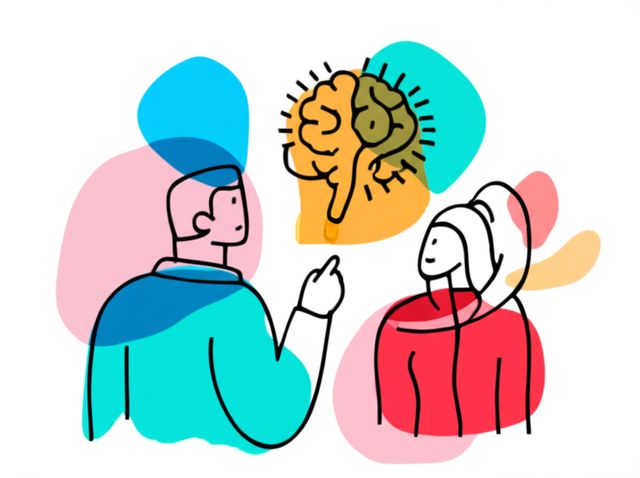Clinical Psychologist
Exploring a Career as a Clinical Psychologist
Clinical psychology is a branch of psychology focused on assessing, diagnosing, and treating mental, emotional, and behavioral disorders. These can range from short-term difficulties to severe, chronic conditions. Clinical psychologists aim to understand individuals' thoughts, emotions, and behaviors and use this knowledge to help improve their well-being and overall functioning. It's a field dedicated to providing comprehensive mental healthcare to individuals, families, and groups.
Working as a clinical psychologist can be incredibly engaging. You might find yourself unraveling the complexities of the human mind, helping individuals overcome significant life challenges, or contributing to research that advances our understanding of mental health. The opportunity to make a tangible, positive impact on people's lives is a powerful motivator for many in this profession. Furthermore, the field offers diverse career paths, from private practice to working in hospitals, schools, or research institutions.
Introduction to Clinical Psychology
This article will provide a comprehensive overview of the field of clinical psychology. We will delve into the specific roles and responsibilities, the educational journey required, and the various career opportunities available. We will also explore the ethical considerations inherent in the profession and examine current industry trends and the future outlook for clinical psychologists.
Defining Clinical Psychology and Its Scope
Clinical psychology is a specialized area within psychology dedicated to providing ongoing and comprehensive mental and behavioral healthcare. This includes working with individuals, couples, families, and even entire communities. The scope of clinical psychology is broad, addressing a wide array of mental and behavioral health issues across all ages and diverse populations. It involves the integration of scientific knowledge and clinical practice to understand, prevent, and relieve psychologically-based distress or dysfunction and to promote well-being and personal development.
Professionals in this field, known as clinical psychologists, assess and diagnose mental, emotional, and behavioral disorders. They develop and implement treatment plans, often utilizing various forms of psychotherapy. Beyond direct client care, clinical psychologists may also be involved in research, teaching, supervision, program development, and consultation. Their work settings are varied and can include hospitals, clinics, private practices, universities, schools, and government agencies.
These courses provide a solid introduction to the fundamental concepts of psychology, including its history, research methods, and various subfields. They are excellent starting points for anyone curious about the scientific study of the mind and behavior.
Distinguishing Clinical Psychology from Related Fields
It's common for people to confuse clinical psychology with related fields like counseling psychology and psychiatry. While there are overlaps, key distinctions exist. Clinical psychologists typically deal with a wide range of mental health issues, including more severe psychological disorders. Counseling psychologists often focus on helping individuals address emotional, social, educational, and vocational challenges that are less severe in nature, often related to life transitions or developmental issues. However, both clinical and counseling psychologists assess, diagnose, and treat mental, emotional, and behavioral disorders.
Psychiatrists, on the other hand, are medical doctors who specialize in mental health. A primary difference is that psychiatrists can prescribe medication, while in most states, clinical psychologists cannot. Psychiatrists often approach mental health from a more medical perspective, considering biological and neurological factors, while clinical psychologists typically focus on psychological assessment and psychotherapy. All three professions play vital roles in the mental healthcare system and often collaborate to provide comprehensive care.
For those looking to deepen their understanding of psychological disorders and their treatment, the following resources are highly recommended. The books provide comprehensive diagnostic criteria and information on psychopathology, while the course offers a focused introduction to clinical psychology.
Core Objectives of Clinical Psychologists
The fundamental goal of a clinical psychologist is to reduce psychological distress and enhance and promote psychological well-being. They achieve this through a variety of activities. A core objective is the assessment and diagnosis of psychological, emotional, and behavioral issues. This involves using interviews, psychological tests, and observations to understand a client's challenges.
Another primary objective is the development and implementation of effective treatment plans. Clinical psychologists utilize evidence-based therapeutic interventions tailored to the individual's specific needs and goals. They also strive to help clients understand their conditions, develop coping strategies, and make positive changes in their lives. Furthermore, many clinical psychologists engage in research to advance the scientific understanding of mental health and to develop and evaluate new treatments. Education and advocacy for mental health are also important objectives within the field.
Roles and Responsibilities of a Clinical Psychologist
The work of a clinical psychologist is multifaceted, involving a range of professional activities aimed at improving mental health and well-being. These professionals are integral to the healthcare system, providing expert care to individuals facing diverse psychological challenges.
Assessment and Diagnosis of Mental Health Disorders
A primary responsibility of clinical psychologists is the assessment and diagnosis of mental health disorders. This process involves gathering comprehensive information about an individual's psychological, emotional, and behavioral functioning. Clinical psychologists utilize a variety of tools and techniques, including clinical interviews, behavioral observations, and standardized psychological tests (e.g., personality, intelligence, or aptitude tests).
The goal of assessment is not only to identify and diagnose specific disorders, such as anxiety, depression, or schizophrenia, but also to understand the unique factors contributing to an individual's distress. This includes exploring personal history, social and family influences, and coping styles. An accurate diagnosis is crucial for developing an effective and individualized treatment plan. Clinical psychologists often use diagnostic manuals like the Diagnostic and Statistical Manual of Mental Disorders (DSM) or the International Classification of Diseases (ICD) to guide their diagnostic process.
These resources offer foundational knowledge in understanding and identifying various psychological conditions, which is a cornerstone of clinical practice.
Therapeutic Interventions
Once a diagnosis is established, clinical psychologists develop and implement therapeutic interventions designed to alleviate symptoms and improve functioning. They employ a wide array of evidence-based psychotherapies, tailoring their approach to the client's specific needs, preferences, and cultural background. Common therapeutic modalities include Cognitive Behavioral Therapy (CBT), which focuses on identifying and changing negative thought patterns and behaviors.
Other approaches include psychodynamic therapy, which explores unconscious patterns and past experiences; humanistic therapy, which emphasizes personal growth and self-actualization; and systems or family therapy, which addresses issues within the context of family relationships. Clinical psychologists monitor client progress throughout therapy, adjusting treatment plans as needed to ensure the best possible outcomes. The ultimate aim is to empower clients with skills and insights to manage their mental health effectively.
The following courses offer insights into specific therapeutic techniques, particularly Cognitive Behavioral Therapy (CBT), which is a widely used and effective approach for various mental health conditions.
Collaboration with Healthcare Professionals
Clinical psychologists often work as part of a multidisciplinary team, collaborating with other healthcare professionals to provide comprehensive patient care. This collaboration may involve psychiatrists, primary care physicians, social workers, nurses, occupational therapists, and school counselors. Such teamwork ensures that all aspects of a patient's health – physical, psychological, and social – are addressed in an integrated manner.
For instance, a clinical psychologist might work with a psychiatrist to manage a patient's medication regimen alongside psychotherapy. In a hospital setting, they may consult with medical doctors about the psychological impact of physical illness. In schools, they might collaborate with teachers and counselors to support students with learning or behavioral difficulties. Effective communication and a shared understanding of treatment goals are essential for successful collaboration and optimal patient outcomes.
Research and Evidence-Based Practice
A commitment to research and evidence-based practice is a hallmark of clinical psychology. Clinical psychologists are trained not only to apply existing research findings in their clinical work but also to contribute to the scientific knowledge base through their own research. Evidence-based practice involves integrating the best available research with clinical expertise and patient values and preferences to make decisions about care.
Many clinical psychologists conduct research on a wide range of topics, including the causes and correlates of mental disorders, the effectiveness of different therapeutic interventions, and factors that promote psychological well-being. They may publish their findings in peer-reviewed journals and present them at professional conferences. This ongoing cycle of research and practice ensures that clinical psychology remains a scientifically grounded discipline that continually strives to improve the effectiveness of mental healthcare.
Understanding research methodologies is crucial for evidence-based practice. These books provide comprehensive guidance on research design and social measurement, essential skills for any aspiring or practicing clinical psychologist involved in research.
Formal Education Pathways
The journey to becoming a clinical psychologist is a rigorous and lengthy one, requiring significant academic achievement and practical training. Understanding the educational requirements is the first step for anyone considering this rewarding career.
Pre-University Preparation
Aspiring clinical psychologists can begin laying the groundwork for their careers even before entering university. Taking psychology courses in high school, if available, can provide an initial understanding of the field. Engaging in volunteer work or paid positions in settings related to mental health, such as hospitals, community centers, or support hotlines, can offer valuable firsthand experience and insight.
Developing strong communication, interpersonal, and critical thinking skills is also crucial. Excelling in subjects like biology, statistics, and English can provide a solid academic foundation. Reading broadly about psychology and mental health can further fuel interest and provide a better understanding of the diverse areas within the field. This early preparation can not only strengthen a university application but also confirm whether this career path aligns with one's interests and aptitudes.
These courses can provide a taste of university-level psychology and help build foundational knowledge, which is beneficial for students still in high school or preparing for undergraduate studies.
Undergraduate and Graduate Degree Requirements
The typical first step in formal education is to earn a bachelor's degree, usually in psychology. While a psychology major is most common, students with degrees in related fields like sociology, biology, or social work can also pursue graduate studies in clinical psychology, though they might need to complete prerequisite psychology courses. During undergraduate studies, gaining research experience by working in a professor's lab or completing an honors thesis is highly advantageous for graduate school applications.
Following a bachelor's degree, the next crucial step is to obtain a graduate degree, which is typically a doctoral degree (either a Ph.D. or a Psy.D.) in clinical psychology. Master's degree programs in clinical psychology exist, but in most jurisdictions, a doctorate is required for licensure as a clinical psychologist. Graduate programs are highly competitive and involve advanced coursework in psychological theory, research methods, assessment, and intervention techniques.
These books offer a broad overview of psychology, suitable for undergraduate students or those looking to refresh their general knowledge before delving into more specialized topics.
Doctoral Programs (Ph.D./Psy.D.) and Licensure Processes
Doctoral programs in clinical psychology typically take four to seven years to complete after the bachelor's degree. There are two main types of doctoral degrees: the Doctor of Philosophy (Ph.D.) and the Doctor of Psychology (Psy.D.). Ph.D. programs traditionally emphasize a scientist-practitioner model, integrating research and clinical practice, and are often a good fit for those interested in academic or research careers alongside clinical work. Psy.D. programs generally follow a practitioner-scholar model, with a stronger emphasis on clinical training and practice, suiting those primarily focused on providing direct clinical services.
Both Ph.D. and Psy.D. programs include extensive supervised clinical experience, often through practicum placements and a year-long predoctoral internship. After completing the doctorate and accumulating the required supervised postdoctoral hours (which vary by state/province), individuals must pass a national examination and any state-specific exams to become licensed. Licensure is mandatory to practice independently as a clinical psychologist.
To understand the nuances between different doctoral paths, these resources can be helpful. OpenCourser also offers a wide selection of psychology courses for further exploration.
Accreditation Standards for Programs
When choosing a graduate program in clinical psychology, accreditation is a critical factor. In the United States and Canada, programs accredited by organizations like the American Psychological Association (APA) or the Canadian Psychological Association (CPA) meet established standards for quality education and training. Graduating from an accredited program is often a requirement for licensure in most jurisdictions.
Accreditation ensures that the program provides comprehensive training in core areas of psychology, including research, ethics, assessment, and intervention. It also signifies that the program has adequate resources, qualified faculty, and provides appropriate supervised clinical experiences. Prospective students should thoroughly research the accreditation status of any program they are considering. Information about accredited programs can usually be found on the websites of the respective accrediting bodies.
Online and Independent Learning
While the traditional path to becoming a clinical psychologist involves formal, campus-based education, online resources and independent learning can play a valuable supplementary role. For those exploring the field, transitioning careers, or seeking to deepen their understanding, digital platforms offer a wealth of knowledge.
Feasibility of Online Learning for Foundational Knowledge
Online courses can be an excellent way to build foundational knowledge in psychology. Many reputable universities and educational platforms offer introductory psychology courses, as well as courses on specific topics like abnormal psychology, developmental psychology, or cognitive psychology. These can be particularly useful for individuals who are considering a career change and want to test the waters before committing to a full degree program. They can also help students supplement their existing education by providing different perspectives or deeper dives into areas of interest.
However, it's crucial to understand that online courses alone cannot replace the rigorous, supervised clinical training required to become a licensed clinical psychologist. While they can provide theoretical understanding, the hands-on experience gained through practicums and internships under the guidance of licensed professionals is indispensable. OpenCourser makes it easy to search through thousands of online courses, allowing learners to explore various psychology topics and find resources that fit their learning goals.
These courses provide a solid introduction to the field and can help build a strong theoretical base in psychology, suitable for self-directed learners or those supplementing formal education.
Supplementing Formal Education with Digital Resources
For students already enrolled in formal psychology programs, digital resources can be powerful supplements. Online platforms may offer specialized courses not available at their institution, access to lectures from renowned experts, or interactive tools for understanding complex concepts. Textbooks, academic journals, and research databases are increasingly available online, providing convenient access to a vast body of psychological literature.
Professionals already working in the field can also benefit from online learning to stay updated on the latest research, learn new therapeutic techniques, or fulfill continuing education requirements for licensure. Many professional organizations and universities offer webinars, workshops, and online courses specifically designed for practicing psychologists. Utilizing these resources can enhance clinical skills and ensure that practice remains informed by current evidence.
These books can serve as excellent supplementary reading, offering deeper insights into specific areas of psychology and mental health resources. They can be valuable for students wishing to expand beyond their core curriculum or for professionals seeking to broaden their knowledge.
Self-Guided Projects
Engaging in self-guided projects can be a proactive way to deepen understanding and apply learned concepts. For example, learners could conduct literature reviews on specific psychological disorders or treatment approaches, analyzing and synthesizing information from various academic sources. Analyzing published case studies (while respecting privacy and ethical guidelines) can provide insights into the complexities of clinical presentation and treatment.
Another project could involve researching and summarizing the ethical guidelines relevant to clinical psychology in their specific region. For those interested in research, designing a hypothetical research study, including formulating a research question, outlining a methodology, and considering potential ethical challenges, can be a valuable learning exercise. While these projects don't substitute for formal training, they can enhance critical thinking and research skills. OpenCourser's Learner's Guide offers tips on how to structure self-learning and make the most of available resources.
Limitations of Online Training for Clinical Practice
It is vital to reiterate that while online learning offers many benefits for acquiring knowledge, it has significant limitations when it comes to preparing for direct clinical practice as a clinical psychologist. The development of clinical skills, such as conducting assessments, providing therapy, and navigating complex ethical dilemmas, requires direct, supervised interaction with clients and mentorship from experienced professionals. These hands-on experiences, typically gained through intensive practicum placements and internships, are integral components of accredited doctoral programs and are essential for competent and ethical practice.
Therefore, individuals aspiring to become licensed clinical psychologists should view online learning as a valuable supplement to, rather than a replacement for, formal, accredited degree programs that include substantial in-person clinical training. Understanding this distinction is crucial for setting realistic expectations about the path to this profession.
Career Progression and Opportunities
The field of clinical psychology offers a diverse range of career paths and opportunities for growth. From initial clinical experiences to specialized roles and leadership positions, the journey can be both challenging and deeply rewarding. Understanding the typical progression can help aspiring psychologists plan their careers effectively.
Entry-Level Roles
The formal entry into the clinical aspects of the profession often begins during doctoral training with practicum placements. These placements provide students with their initial supervised experiences in conducting assessments and providing therapy in various settings, such as university clinics, community mental health centers, or hospitals. Following coursework and practicum, a crucial step is the predoctoral internship, which is typically a full-year, intensive supervised clinical experience.
After obtaining a doctoral degree and completing any required postdoctoral supervised hours, individuals become eligible for licensure. Once licensed, early career psychologists might work in settings like community mental health agencies, hospitals, group practices, or schools. Some may also pursue postdoctoral fellowships for further specialized training in a particular area of interest. These initial roles are critical for honing clinical skills and gaining broader experience.
Mid-Career Specializations
As clinical psychologists gain experience, many choose to specialize in a particular area of practice or work with specific populations. This specialization often reflects their interests, further training, and the needs of the communities they serve. Some common areas of specialization include child and adolescent psychology, neuropsychology (focusing on brain-behavior relationships), health psychology (addressing psychological factors in physical health), forensic psychology (applying psychological principles to legal issues), and geropsychology (working with older adults).
Specialization can involve obtaining additional certifications, attending specialized workshops and training, and focusing research and clinical work in a chosen niche. Developing expertise in a specific area can lead to increased professional recognition, opportunities for consultation, and the ability to provide highly specialized care. The American Psychological Association recognizes various specialties in professional psychology, providing a framework for advanced practice.
These courses delve into specific populations and conditions, reflecting potential areas of mid-career specialization for clinical psychologists.
Leadership Roles
With significant experience and often additional training or qualifications, clinical psychologists can advance into leadership and administrative roles. These might include positions such as director of a psychology clinic or mental health agency, chief psychologist in a hospital setting, or department chair in an academic institution. Leadership roles often involve supervising other psychologists and mental health professionals, managing budgets, developing programs, and shaping policy.
These positions require strong clinical skills as well as expertise in management, administration, and advocacy. Clinical psychologists in leadership roles play a vital part in ensuring the quality of mental healthcare services, promoting ethical practice, and advancing the field within their organizations and communities.
Transitioning to Research or Policy Work
While many clinical psychologists focus on direct client care, some may transition into roles that are more heavily focused on research or policy work. Those with a strong research background, particularly from Ph.D. programs, might pursue full-time academic research positions, conducting studies, publishing findings, and seeking grants. Their clinical experience can provide valuable insights into research questions with real-world relevance.
Others may leverage their expertise to influence mental health policy at local, state, or national levels. This could involve working for government agencies, non-profit organizations, or advocacy groups. In these roles, clinical psychologists can contribute to shaping mental health systems, improving access to care, and advocating for policies that support psychological well-being. This path allows for a broader impact on population mental health.
Ethical Considerations and Challenges
The practice of clinical psychology is guided by a strong set of ethical principles designed to protect the welfare and rights of clients. Navigating these ethical responsibilities is a core component of the profession and presents unique challenges that clinicians must be prepared to address. The American Psychological Association's Ethical Principles of Psychologists and Code of Conduct provides a comprehensive framework for ethical decision-making.
Confidentiality and Informed Consent
Confidentiality is a cornerstone of the therapeutic relationship. Clinical psychologists have a duty to protect the privacy of information shared by clients during therapy. This means that, with few exceptions, they cannot disclose what a client says without their explicit permission. Exceptions to confidentiality typically involve situations where there is an imminent risk of harm to the client or others, suspected child or elder abuse, or when required by a court order.
Informed consent is another critical ethical obligation. Before beginning therapy, psychologists must provide clients with clear information about the nature of treatment, including the therapeutic approach, potential risks and benefits, fees, and the limits of confidentiality. This allows clients to make an informed decision about whether to proceed with services. Ensuring that clients understand this information, particularly those with diminished capacity or from diverse cultural backgrounds, is an ongoing responsibility.
Managing Dual Relationships
Dual relationships, also known as multiple relationships, occur when a psychologist is in a professional role with a person and also in another role with the same person, or with someone closely associated with that person. Examples include having a client who is also a friend, student, or business associate. The APA Ethics Code advises psychologists to avoid dual relationships that could impair their objectivity, competence, or effectiveness, or that could exploit or harm the other party.
Managing boundaries in professional relationships can be challenging, especially in smaller communities. Psychologists must be vigilant in recognizing potential dual relationships and take steps to manage or avoid them to protect the client's welfare and maintain professional integrity. This may involve careful consideration of the potential impact of the relationship and, if necessary, referring the client to another professional.
Cultural Competence in Diverse Populations
Providing effective psychological services requires cultural competence – the ability to understand, appreciate, and interact effectively with people from cultures or belief systems different from one's own. Clients come from diverse backgrounds with varying cultural norms, values, and experiences that can significantly influence their understanding of mental health, their willingness to seek help, and their responses to therapy.
Clinical psychologists have an ethical responsibility to strive for cultural competence. This involves ongoing self-reflection about one's own cultural biases, seeking knowledge about different cultural groups, and adapting therapeutic approaches to be culturally sensitive and appropriate. It means recognizing how factors like race, ethnicity, religion, socioeconomic status, sexual orientation, and gender identity can impact a client's experience and tailoring interventions accordingly. A lack of cultural competence can lead to misdiagnosis, ineffective treatment, and harm to the client.
Understanding diverse perspectives is crucial for cultural competence. These courses explore aspects of gender, sexuality, and specific cultural considerations in mental health, which can broaden a clinician's understanding.
Burnout and Self-Care Strategies
Working as a clinical psychologist can be emotionally demanding. Regularly dealing with clients' distress, trauma, and challenging life circumstances can take a toll on a clinician's own mental and emotional well-being, potentially leading to burnout. Burnout is characterized by emotional exhaustion, depersonalization (a sense of detachment from clients), and a reduced sense of personal accomplishment.
Recognizing the signs of burnout and proactively engaging in self-care strategies is crucial for maintaining professional effectiveness and personal health. Self-care can include maintaining a healthy work-life balance, seeking peer support or supervision, engaging in regular physical activity, practicing mindfulness or relaxation techniques, and pursuing hobbies and interests outside of work. Professional organizations also emphasize the importance of self-care as an ethical imperative for psychologists to ensure they can provide competent care.
These courses touch upon emotional well-being and stress management, which are relevant for both clients and clinicians practicing self-care.
Industry Trends and Future Outlook
The field of clinical psychology is continually evolving, influenced by technological advancements, changes in healthcare systems, and a growing societal awareness of mental health. Staying abreast of these trends is important for both aspiring and practicing clinical psychologists. The overall employment for psychologists is projected to grow, with increasing demand for psychological services.
Teletherapy and Digital Mental Health Tools
The rise of teletherapy and other digital mental health tools represents one of the most significant recent trends in clinical psychology. Teletherapy, which involves providing psychological services remotely via video conferencing, phone calls, or messaging platforms, has expanded access to care for many individuals, particularly those in rural or underserved areas, or those with mobility issues. It gained considerable traction during the COVID-19 pandemic and continues to be a prevalent mode of service delivery.
Alongside teletherapy, a variety of digital mental health tools, such as mobile apps for managing anxiety or tracking mood, virtual reality applications for exposure therapy, and online psychoeducational programs, are becoming more common. While these technologies offer exciting possibilities for enhancing and extending mental healthcare, they also present new ethical and practical challenges, such as ensuring data privacy, maintaining therapeutic rapport, and addressing the digital divide. Clinical psychologists will need to navigate these tools thoughtfully and ethically.
Integration with Primary Care Systems
There is a growing movement towards integrating mental healthcare with primary care services. This approach recognizes that many individuals first seek help for mental health concerns from their primary care physicians and that physical and mental health are often interconnected. Integrating clinical psychologists and other behavioral health providers into primary care settings can improve early identification of mental health issues, facilitate access to psychological services, and promote a more holistic approach to patient care.
In an integrated care model, clinical psychologists might work alongside physicians, providing brief interventions, consultations, or facilitating referrals to more intensive specialty mental health services when needed. This collaborative approach aims to reduce stigma, improve patient outcomes, and potentially lower overall healthcare costs. According to a report from the Centre for Mental Health, integrating clinical psychologists into primary care can offer effective support to people who previously received little or no help.
These courses touch upon aspects of health psychology and healthcare systems, which are relevant to the integration of psychological services in primary care settings.
Demand in Underserved Regions
Despite the growing awareness of mental health, significant disparities in access to care persist, particularly in rural and economically disadvantaged areas, as well as for certain minority populations. There is a substantial need for clinical psychologists and other mental health professionals in these underserved regions. Factors contributing to these disparities include a shortage of providers, transportation barriers, financial constraints, and cultural factors that may influence help-seeking behaviors.
Efforts to address this demand include incentivizing psychologists to work in underserved areas, expanding teletherapy services, and developing culturally sensitive outreach programs. For clinical psychologists passionate about social justice and health equity, working in an underserved community can be a particularly meaningful career path, offering the opportunity to make a significant impact where the need is greatest.
Impact of AI on Diagnostic Practices
Artificial intelligence (AI) is beginning to make inroads into various aspects of healthcare, including mental health, and its potential impact on diagnostic practices is a subject of ongoing discussion and research. AI algorithms are being developed to analyze large datasets, including speech patterns, facial expressions, and even social media activity, to identify potential markers of mental health conditions. Some researchers are exploring AI's potential to assist in early detection, personalize treatment recommendations, or even predict treatment response.
However, the use of AI in diagnostics also raises significant ethical and practical questions. Concerns about algorithmic bias, data privacy, the potential for over-reliance on technology, and the importance of human clinical judgment in the diagnostic process are paramount. While AI may eventually offer valuable tools to support clinicians, it is unlikely to replace the nuanced assessment and interpersonal connection that are central to the work of clinical psychologists. The field will need to carefully evaluate and integrate these technologies in a way that enhances, rather than diminishes, the quality and humanity of care.
Salary and Job Market Realities
For those considering a career as a clinical psychologist, understanding the financial aspects and job market conditions is an important part of the decision-making process. While the desire to help others is often a primary motivator, practical considerations regarding earning potential and employment opportunities are also key.
Median Salary Ranges by Region and Setting
The median annual wage for psychologists was $94,310 in May 2024, according to the U.S. Bureau of Labor Statistics (BLS). However, this figure can vary significantly based on factors such as geographic location, years of experience, specialization, and the type of work setting. For example, salaries may be higher in urban areas with a higher cost of living compared to rural areas. Clinical psychologists working in private practice may have different earning potentials than those employed in government agencies, hospitals, or academic institutions.
It's also worth noting that the top 10 percent of psychologists earned more than $157,330 in May 2024. Experience plays a significant role, with salaries often increasing with more years in the field. Prospective clinical psychologists should research salary expectations for their specific geographical region and desired work setting.
Public vs. Private Sector Compensation
Compensation for clinical psychologists can differ between the public and private sectors. Those working in private practice often have the potential to earn higher incomes, particularly as they establish their reputations and build their client base. However, private practice also comes with the responsibilities of running a business, including managing overhead costs, billing, and marketing.
Psychologists employed in the public sector, such as in government agencies, public hospitals, or schools, may have more stable salaries and comprehensive benefits packages, though the base salary might sometimes be lower than in successful private practices. Academic positions at universities typically involve a combination of teaching, research, and sometimes clinical practice, with salaries varying based on rank and institution. Each sector offers different advantages and considerations regarding compensation and work environment.
Freelance/Private Practice Considerations
Many clinical psychologists are drawn to the autonomy and flexibility of private practice. Building a successful private practice requires not only strong clinical skills but also business acumen. This includes managing finances, marketing services, navigating insurance panels, and maintaining administrative records. While the earning potential can be high, income can also be variable, especially in the early stages of establishing a practice.
It often takes time to build a consistent client referral base. Networking with other professionals, developing a niche area of expertise, and effective marketing are important for success. Some psychologists start in group practices or work part-time in an agency setting while building their private practice. The decision to enter private practice should be carefully considered, weighing the potential rewards against the entrepreneurial challenges.
Geographic Demand Variations
The demand for clinical psychologists can vary significantly by geographic location. While there is a general need for mental health services across the country, some areas, particularly rural and underserved communities, face more acute shortages of qualified professionals. Conversely, some urban areas may have a higher concentration of psychologists, leading to more competition for certain positions.
The U.S. Bureau of Labor Statistics projects that overall employment of psychologists will grow 7 percent from 2023 to 2033, which is faster than the average for all occupations. Demand for clinical and counseling psychologists is expected to increase as more people seek help for mental health issues. Those willing to work in underserved areas or with specific in-demand populations may find more numerous job opportunities. Researching the job market in specific geographic regions of interest is advisable for those planning their careers.
Historical Evolution of Clinical Psychology
Understanding the history of clinical psychology provides valuable context for its current practices and future directions. The field has evolved significantly from its early philosophical and medical roots to the scientifically grounded profession it is today.
Early Influences
The formal beginnings of clinical psychology are often traced to the late 19th and early 20th centuries. Lightner Witmer is credited with opening the first psychological clinic in the United States at the University of Pennsylvania in 1896, primarily focused on assessing and treating children with learning and behavioral problems. This marked a shift towards applying psychological principles to practical problems.
Early in the 20th century, the work of figures like Sigmund Freud and the rise of psychoanalysis had a profound impact on the understanding and treatment of mental illness, emphasizing the role of unconscious processes and early experiences. Simultaneously, the behaviorist movement, championed by psychologists like John B. Watson and B.F. Skinner, offered a different perspective, focusing on observable behaviors and the principles of learning. These diverse early influences laid the groundwork for the multifaceted field that clinical psychology would become.
These courses and books offer insights into the foundational theories and historical context of psychology, which are essential for understanding the evolution of clinical practice.
Shift Toward Evidence-Based Practice
For much of the first half of the 20th century, clinical psychology was heavily focused on psychological assessment, with less emphasis on standardized treatment interventions. The experiences of World War II significantly changed the field, as there was a massive need for mental health services for returning veterans. This spurred the growth of clinical psychology and led to a greater emphasis on treatment and psychotherapy.
A pivotal moment was the 1949 Boulder Conference, which endorsed the "scientist-practitioner" model for doctoral training. This model emphasized the integration of scientific research and clinical practice, encouraging psychologists to be both skilled clinicians and capable researchers who could contribute to and apply empirical knowledge. This marked a significant shift towards evidence-based practice, where therapeutic interventions are evaluated through rigorous scientific research to determine their effectiveness. This commitment to empirical validation remains a core tenet of modern clinical psychology.
Modern Diagnostic Frameworks
The development and refinement of standardized diagnostic classification systems have been crucial to the evolution of clinical psychology and psychiatry. The Diagnostic and Statistical Manual of Mental Disorders (DSM), published by the American Psychiatric Association, and the International Classification of Diseases (ICD), by the World Health Organization, provide standardized criteria for diagnosing mental health disorders.
These manuals aim to increase diagnostic reliability and provide a common language for clinicians, researchers, and public health officials. The DSM, currently in its fifth edition, text revision (DSM-5-TR), and the ICD, in its eleventh revision (ICD-11), are periodically updated to reflect advances in research and understanding of mental disorders. While these frameworks are essential tools, they are also subject to ongoing discussion and critique regarding their categorical nature and cultural applicability. Clinical psychologists are trained in the use of these diagnostic systems as part of their assessment and treatment planning. [987ynr]
These essential reference books provide the diagnostic criteria used by mental health professionals worldwide and are indispensable for students and practitioners in clinical psychology.
Frequently Asked Questions
This section addresses some common questions that individuals exploring a career in clinical psychology may have.
Is a PhD required to become a clinical psychologist?
In most jurisdictions in the United States and Canada, a doctoral degree (either a Ph.D. or a Psy.D.) is required to become a licensed clinical psychologist and practice independently. While some master's level positions exist in the broader mental health field, the title and full scope of practice of a "clinical psychologist" are typically reserved for those with a doctorate and licensure. Some states may allow master's level practitioners to provide certain psychological services under the supervision of a licensed doctoral-level psychologist.
Can clinical psychologists prescribe medication?
Traditionally, clinical psychologists have not been authorized to prescribe medication. Psychiatrists, who are medical doctors (MDs or DOs), are typically the mental health professionals who prescribe and manage psychotropic medications. However, a few states in the U.S. (New Mexico, Louisiana, Illinois, Iowa, and Idaho, as of recent information) have passed laws allowing appropriately trained clinical psychologists with additional postdoctoral education in psychopharmacology to obtain prescriptive authority. This is an evolving area, and the requirements and availability of such training vary by state. In most places, however, psychologists collaborate with medical prescribers when medication is part of a client's treatment plan.
What are typical work settings for clinical psychologists?
Clinical psychologists work in a wide variety of settings. Many are in private practice, either solo or as part of a group. Hospitals (general and psychiatric), outpatient clinics, and community mental health centers are also common employers. Other settings include schools and universities (providing counseling services, teaching, or conducting research), veterans' affairs medical centers, correctional facilities, rehabilitation facilities, and long-term care facilities. Some clinical psychologists also work in corporate settings as consultants or in forensic settings, such as court clinics or legal firms.
What are some career advancement opportunities without a doctoral degree in psychology?
While a doctorate is typically required to be a licensed clinical psychologist, a bachelor's or master's degree in psychology can open doors to various related career paths. With a bachelor's degree, individuals might find roles as psychiatric technicians, case managers, social and human service assistants, or in research support positions. A master's degree can lead to careers as licensed professional counselors (LPC), marriage and family therapists (MFT), school counselors, or substance abuse counselors, depending on the specific degree, coursework, supervised experience, and state licensure requirements. These roles often involve providing direct client services under different professional titles and scopes of practice than a clinical psychologist. Many individuals also use a psychology background as a foundation for careers in human resources, market research, education, or social work.
For those exploring alternative career paths or roles that may not require a full doctorate in clinical psychology, these related career options are worth considering. OpenCourser's Career Development section can offer further guidance.
Are there part-time vs. full-time opportunities in clinical psychology?
Yes, there are both part-time and full-time opportunities for clinical psychologists. Many clinical psychologists in private practice have the flexibility to set their own hours, which can allow for part-time work. Part-time positions may also be available in clinics, hospitals, or academic settings, although these are often more common in certain specialties or locations. Some psychologists choose to work part-time while balancing family responsibilities, pursuing further education, or transitioning towards retirement. Full-time employment is common across most settings, particularly in salaried positions within organizations.
Is there a demand for bilingual or multilingual clinicians?
Yes, there is a significant and growing demand for bilingual and multilingual clinical psychologists. As populations become more diverse, the need for mental health professionals who can provide services in languages other than English and who understand the cultural nuances of different communities increases. Language barriers can be a major obstacle to accessing mental healthcare. Clinicians who can communicate effectively with clients in their native language and provide culturally competent care are highly valued. This is particularly true in areas with large immigrant populations or diverse linguistic communities. Possessing fluency in more than one language can be a considerable asset in the job market and can greatly enhance a psychologist's ability to serve a wider range of clients.
Useful Links and Resources
For those seeking further information about clinical psychology, the following resources may be helpful:
- American Psychological Association (APA): The leading scientific and professional organization representing psychology in the United States. Their website offers a wealth of information on various psychology topics, careers, ethics, and accredited programs.
- Bureau of Labor Statistics - Psychologists: Provides detailed information on the occupational outlook for psychologists, including job duties, education requirements, salary, and job growth projections.
- OpenCourser - Psychology: Explore a wide range of online courses related to psychology, from introductory to advanced topics.
- OpenCourser Learner's Guide: Discover resources and tips for making the most of online learning.
Embarking on a career as a clinical psychologist is a significant commitment that requires dedication, rigorous training, and a genuine passion for helping others. It is a field that offers profound intellectual challenges and deep personal rewards. While the path is demanding, the opportunity to make a meaningful difference in the lives of individuals, families, and communities is a powerful draw for many. We hope this article has provided a comprehensive and realistic overview to help you determine if this fulfilling career is the right path for you.























